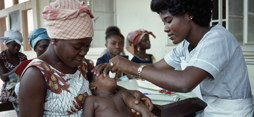

Building capacity to enhance ethics and human rights protection of participants in biomedical research
Ethics, human rights and justice in clinical research of drugs in developing countries
UNICRI and AIFA collaborate to protect human rights and promote ethical and legal standards for clinical drug trials in developing countries
UNICRI has recently received a contribution from the Italian Medicines Agency (AIFA) to implement a new training and technical cooperation project aimed at the promotion of ethics, law and the human rights of participants in clinical research of drugs in developing countries.
The aim of this project is to carry out the recommendations of a 2008 study conducted by UNICRI and AIFA, as the responsible agency in Italy for pharmaceutical control, to verify that the ethical and scientific principles of Good Clinical Practice (GCP) are being applied in clinical research trials in developing countries, particularly in sub-Saharan Africa.
The previous research study culminated with an international Round Table event, during which the need for urgent intervention to attain adequate ethical and legal standards throughout the developing world was reaffirmed.
With the economic, political and social links between different regions of the world becoming ever more important, AIFA would like to contribute to the implementation of a project to establish ethical standards in clinical trials in countries which lack any specific legislation or guidelines.
The United Nations strongly supports initiatives aimed at establishing a reliable base of knowledge and strengthening the capabilities of local professionals. It is only through the sharing of data and expertise that the disparities and inequalities between different regions can be overcome. Providing training, improving knowledge, and sharing information are at the core of UNICRI’s mandate. Since its establishment in 1968, the Institute has conducted training programmes for government officials around the world to guarantee the correct application of relevant international legal instruments on crime prevention and justice.
UNICRI and AIFA will work closely together to provide strong support to countries that are still far from reaching minimum standards of ethical and legal protection for patients enrolled in clinical trials. The two institutions will organize practical and theoretical courses for the training of health professionals in a Sub-Saharan country.
In order to ensure the long-term sustainability of the project, the training courses will assist in the development of a best practice model. This will be made available for those responsible for the rights and well-being of patients in other countries and regions.
UNICRI and AIFA aim to establish a permanent network of professionals in Africa who are trained in the standards of ethics and law regarding clinical drug research. By combining this knowledge with an understanding of local social, economic and health issues, this network will have the potential to become an international model for promoting and applying Good Clinical Practice.
UNICRI, in collaboration with the Tanzanian National Institute for Medical Research (NIMR), AIFA and the Bambino Gesù Pediatric Hospital organized the training course “Good Clinical Practice: the promotion of international harmonization for the respect of ethical principles, human rights, and justice.
The course, held in Tanzania, from 11-14 June 2012, aimed at increasing the expertise of officers and professionals working in the field of pharmaceutical clinical research with human participants and strengthening knowledge of ethical, scientific, and regulatory aspects of Good Clinical Practice Guidelines. The course has laid the groundwork for establishing an African-European network of professionals trained in the international standards of clinical trials. Further action will include the delivery of the training modules to other professionals in Tanzania and eventually to other countries in the Region.
 unicri.it
unicri.it



